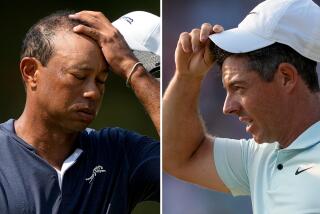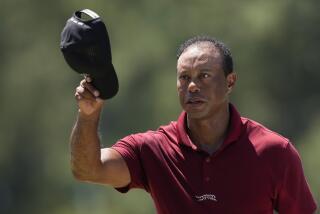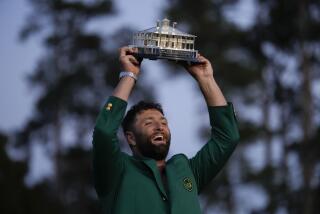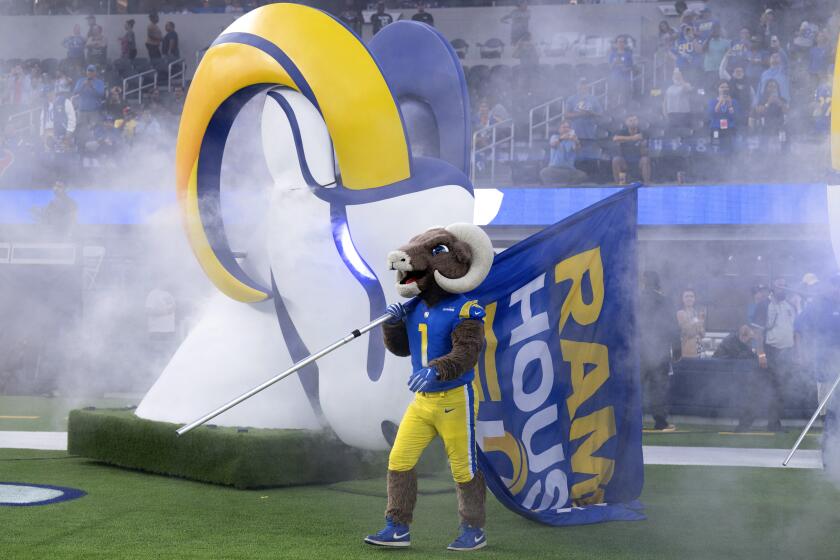Master of All
AUGUSTA, Ga. — That noise you heard Sunday at Augusta National was the new game in town, the Tiger Slam, a sound heard round the golf world, bouncing off the Georgia pines, rattling against the stones at Hogan Bridge, skimming across Rae’s Creek and slamming into the sport’s history books.
Tiger Woods, the greatest player of his generation, joined Bobby Jones, the greatest player of his generation, when he won the Masters for a second time and completed his version of a Grand Slam by holding all four major championship titles at the same time.
“Some of the golf gods were looking down on me in the right way,” he said.
Woods shot a four-under-par 68 and birdied the last hole to win the Masters by two shots over hard-luck and hard-charging David Duval to claim his sixth major title in less than five full years as a professional. Duval finished with a 67 and Phil Mickelson shot a 70 for third place, three shots behind Woods.
While Woods busied himself with the task of picking up his second green jacket, both Duval and Mickelson were turned away in search of their first major championship victory.
Woods not only has won the last four majors--the U.S. Open, British Open and PGA Championship in 2000 and the 2001 Masters--but also five of the last six.
“To win four in succession, it’s hard to believe, really,” he said. “I don’t think I’ve ever accomplished anything this great.”
He is the youngest player to win six majors, at 25 years 3 months 9 days. Jack Nicklaus had been the youngest to reach the plateau of six, which he did with a victory in the 1966 British Open. Nicklaus was 26 years 5 months 19 days.
The last day of the 65th edition of the Masters evolved into a three-way race between Woods, Mickelson and Duval, which might be considered the greatest three-player showdown at Augusta National since Nicklaus, Johnny Miller and Tom Weiskopf squared off in 1975.
What Woods accomplished was certainly historic, but also completely workmanlike, a round that simply got the job done. Woods was either in the lead by himself or shared it with Duval from the 11th hole.
And although Woods left the door ajar for his pursuers when he missed a short birdie putt at the par-five 15th, the scenario was clear.
He did not make another mistake. And it would have taken something special from either Duval or Mickelson to catch him. Instead, both challengers had missteps.
Tied with Woods at 15 under after 15 holes, Duval made a critical bogey on the par-three 16th, the 70th hole, after his seven-iron flew the green. Duval had one more chance to pull even when he stood over a seven-foot birdie putt on the 18th hole, but the ball rolled just past and he settled for par.
“I guess I probably just pulled it a little bit,” he said. “I had it breaking a little bit left. I missed it. I knew I needed to make it.”
It is probably little consolation for Duval, but his 14-under 274 is the best nonwinning score in Masters history. In 59 of the previous 64 Masters, Duval’s score would have been the outright winner and in two others he would have reached a playoff.
He just had the bad luck of needing to defeat the preeminent player of his generation.
Woods could have padded his lead at the 15th green, but he missed a two-foot birdie putt and was forced to settle for a disappointing par.
Even after that, Woods said there were no worries.
“It was just a bad putt,” he said of his birdie attempt. “I blocked it. It’s not exactly what I needed to have happen at that moment. But I still had a one-shot lead and I kept reminding myself of that. I kept saying, ‘Forget that hole. You have three holes to play. You have a one-shot lead. Let’s go ahead and make one more birdie coming in.’ ”
Mickelson was troubled by an inconsistent putter and dropped two shots behind Woods and when he three-putted for a bogey on the 16th. It was a wildly fluctuating round for Mickelson, who had six birdies and four bogeys.
“I’m certainly disappointed right now and I am not thinking about the joy of having the chance to win,” he said.
Mickelson called the 16th hole “a real killer” because he had finally moved to within one shot of Woods. But he hit a poor drive, a pulled seven-iron, and the ball stayed on a slope, far to the right of the flagstick.
“That was a very disappointing shot because I needed to put some pressure and have at least a good birdie opportunity,” he said.
A three-putt later, Mickelson was gone.
Duval did not help himself when he failed to birdie the par-five 13th, then missed his par putt of seven feet at the 16th, missed a birdie putt from 14 feet at the 17th and another birdie put from seven feet at the 18th.
But the shot that ruined it for him was his seven-iron tee shot at the 16th.
“I really don’t have an explanation,” Duval said. “[I had] 183 yards to the flag and I hit a seven-iron and it flew the green. You know, to be perfectly honest with you, I thought I might have made a one. You don’t fly it 190-something yards over the green like I did.”
But that’s what happened.
Meanwhile, Woods was steadily putting up numbers and avoiding mistakes. He bogeyed the 12th when he found the back bunker, but by then he already had established the fact that he was going to keep dropping putts in the hole when he needed to save par, which is what he did at No. 9 and, even more impressive, at No. 10. When his 10-footer fell in, Woods was even with Duval at 14 under.
“That was not an easy putt,” Woods said. “Fast, straight downhill, the grain coming off the left, to be able to make that putt was big.”
There were more big shots to come. At the 13th, he crushed his three-wood drive and had only an eight-iron to the 485-yard hole. He two-putted from 30 feet for an easy birdie and the lead was his.
Duval caught up for an instant with a birdie at the 15th, but gave it back at the 16th and Woods was quick to take advantage.
Afterward, Duval said he could only marvel at Woods’ success.
“You know, it is very difficult to win these events, any of these major tournaments,” he said. “You have to have your game at the right place at the right time, there’s an art to it.”
And the Tiger Slam?
“I don’t know what you can compare it to because I’m not sure if there’s something you could compare it to,” Duval said.
Good point, because there isn’t anything.
Woods was not in a reflective mood afterward, which is not surprising, because he rarely is. He was not after he won his first Masters or when he completed his career Grand Slam with victories in all four majors. Woods insisted he felt relaxed all week because he had won the Masters before and knew he would be invited back, no matter what. And now he has a chance at five consecutive major titles when he defends his U.S. Open title in June at Southern Hills in Tulsa, Okla.
But at present, Woods is left to consider the ramifications of his Tiger Slam and how it might relate to a Grand Slam. He says he isn’t sure, but he is certain of at least one thing.
“It feels good.”
(BEGIN TEXT OF INFOBOX / INFOGRAPHIC)
Tiger by the Numbers
6: Major professional championships won by Woods. (Jack Nicklaus holds record with 18)
65: Strokes under par Woods has played last four majors
5: Major championships, among last six, won by Woods
27: PGA Tournaments won by Woods (Sam Snead holds record with 81)
4: Full seasons played by Woods on PGA Tour
(BEGIN TEXT OF INFOBOX / INFOGRAPHIC)
Majoring in History
TIGER TRACKS
A glance at Tiger Woods’ career on the PGA Tour:
2001
Tournaments: 8
Victories: 3
Second: 0
Top 10: 6
Top 25: 8
Earnings: $3,263,857
2000
Tournaments: 20
Victories: 9
Second: 4
Top 10: 17
Top 25: 20
Earnings: $9,188,321
1999
Tournaments: 21
Victories: 8
Second: 1
Top 10: 16
Top 25: 18
Earnings: $6,616,585
1998
Tournaments: 20
Victories: 1
Second: 2
Top 10: 13
Top 25: 17
Earnings: $1,841,117
1997
Tournaments: 21
Victories: 4
Second: 1
Top 10: 9
Top 25: 14
Earnings: $2,066,833
1996
Tournaments: 8
Victories: 2
Second: 0
Top 10: 5
Top 25: 7
Earnings: $790,594
TOTAL
Tournaments: 112
Victories: 27
Second: 8
Top 10: 66
Top 25: 85
Earnings: $23,767,307
MAJOR ACCOMPLISHMENTS
A look at Woods’ victories in last four majors:
2001 MASTERS
At Augusta National Golf Club, Augusta, Ga. (April 5-8): Claims greatest feat in modern golf with clean sweep of the majors in 294 days with two-shot victory over David Duval. . . . Shot final-round 68, including birdie on final hole, for 16-under 272 total. . . . Traditional Grand Slam means winning four majors in a calendar year--a feat accomplished by Bobby Jones, who in 1930 won the U.S. Open, U.S. Amateur, British Open and British Amateur.
2000 PGA CHAMPIONSHIP
At Valhalla Golf Club, Louisville, Ky. (Aug. 17-20): Became first player since Ben Hogan in 1953 to win three majors in one year when he birdied last two holes and then defeated Bob May in three-hole playoff. . . . Won in dramatic fashion when he blasted out of a bunker to two feet and made par after May’s 40-foot birdie putt just missed. . . . Was first player to repeat as PGA champion since Denny Shute in 1937. . . . With 18-under 270 in regulation, he now holds scoring record in relation to par in every major championship.
2000 BRITISH OPEN
At The Old Course, St. Andrews, Scotland (July 20-23): Wins first British Open by eight shots over Ernie Els and Thomas Bjorn with a final-round 69 for a 19-under 269 total, a record at St. Andrews. . . . Win made him fifth player with a career Grand Slam--he won 2000 U.S. Open, ’97 Masters and ’99 PGA. . . . At 24, he became youngest to win career Grand Slam--Jack Nicklaus, who completed his at age 26 in ’66 British Open, was last to do it.
2000 U.S. OPEN
At Pebble Beach Links, Pebble Beach (June 15-18): Wins first U.S Open in record fashion--by 15 shots over Ernie Els. . . . Became first player in Open’s 106-year history to finish 72 holes at double digits under par--12-under 272. . . . Margin of victory not only shattered Open mark of 11 set by Willie Smith in 1899, but was largest ever in a major, surpassing 13-stroke victory by Old Tom Morris in the 1862 British Open. . . . His 272 tied lowest score ever in a U.S. Open, first set by Jack Nicklaus in 1980 and matched by Lee Janzen in 1993.
ALL-TIME MAJOR TITLES
JACK NICKLAUS (18 TITLES)
* Masters (6): 1963, 1965-66, 1972, 1975, 1986
* U.S. Open (4): 1962, 1967, 1972, 1980
* British Open (3): 1966, 1970, 1978
* PGA Championship (5): 1963, 1971, 1973, 1975, 1980
* Career Grand Slam Age: 26
BEN HOGAN (9)
* Masters (2): 1951, 1953
* U.S. Open (4): 1948, 1950-51, 1953
* British Open (1): 1953
* PGA Championship (2): 1946, 1948
* Career Grand Slam Age: 41
GARY PLAYER (9)
* Masters (3): 1961, 1974, 1978
* U.S. Open (1): 1965
* British Open (3): 1959, 1968, 1974
* PGA Championship (2): 1962, 1972
* Career Grand Slam Age: 29
GENE SARAZEN (7)
* Masters (1): 1935
* U.S. Open (2): 1922, 1932
* British Open (1): 1932
* PGA Championship (3): 1922-23, 1933
* Career Grand Slam Age: 33
TIGER WOODS (6)
* Masters (2): 1997, 2001
* U.S. Open (1): 2000
* British Open (1): 2000
* PGA Championship (2): 1999-00
* Career Grand Slam Age: 24
TWO OR MORE MASTERS
Horton Smith: 1934, 1936
Byron Nelson: 1937, 1942
Jimmy Demaret: 1940, 1947, 1950
Sam Snead: 1949, 1952, 1954
Ben Hogan: 1951, 1953
Arnold Palmer: 1958, 1960, 1962, 1964
Gary Player: 1961, 1974, 1978
Jack Nicklaus: 1963, 1965, 1966, 1972, 1975, 1986
Tom Watson: 1977, 1981
Seve Ballesteros: 1980, 1983
Ben Crenshaw: 1984, 1995
Bernhard Langer: 1985, 1993
Nick Faldo: 1989, 1990, 1996
Jose Maria Olazabal: 1994, 1999
Tiger Woods: 1997, 2001
x-won playoff
More to Read
Go beyond the scoreboard
Get the latest on L.A.'s teams in the daily Sports Report newsletter.
You may occasionally receive promotional content from the Los Angeles Times.










